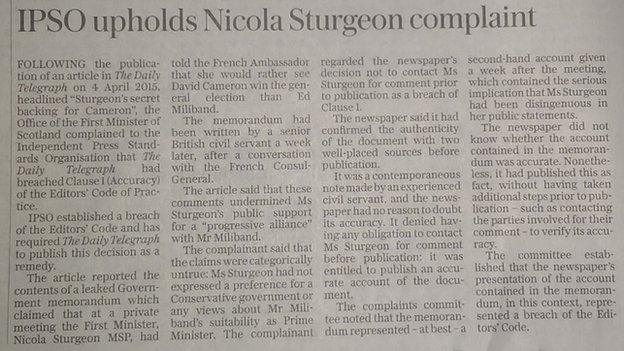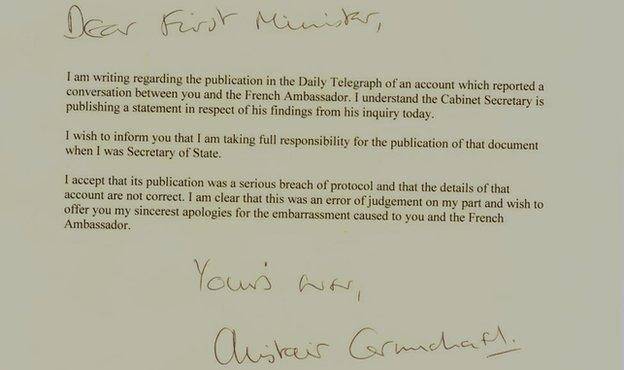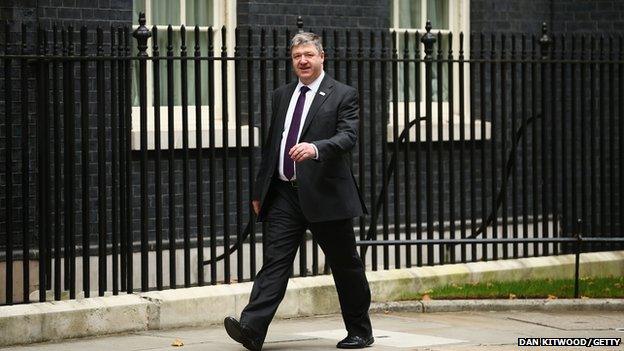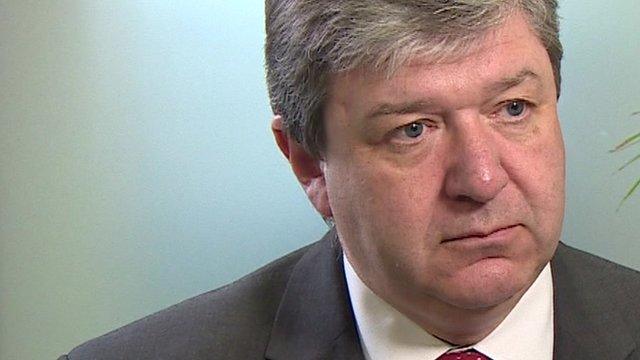Sturgeon memo leak complaint upheld against Daily Telegraph
- Published

Ms Sturgeon categorically denied the memo's claim was true
The press regulator has upheld a complaint against the Daily Telegraph over a story about a leaked government memo involving First Minister Nicola Sturgeon.
The article contained details of a private meeting between MS Sturgeon and the French ambassador Sylvie Bermann.
It suggested that, before the general election, Ms Sturgeon wanted David Cameron to remain as prime minister.
The Independent Press Standards Organisation ruled against the paper, external.
Its complaints committee said that, while the newspaper was entitled to report on the memorandum, it had published its contents as facts without taking additional steps prior to publication - such as contacting the parties involved for their comment - to verify their accuracy.
'Significantly misleading'
It said that, as a result, the article was significantly misleading.
IPSO told the newspaper to publish the adjudication , externalon page two, with a front-page reference, as well as publishing it online.
Former Scottish Secretary Alistair Carmichael has since admitted being behind the leak which he said was an "error of judgement".
He accepted "the details of the account are not correct" and accepted "full responsibility for the publication".

The Daily Telegraph was told to publish the adjudication
The confidential memo was written by a civil servant in the Scotland Office and was a third-hand account of a conversation between the Scottish first minister and the French ambassador.
Both the first minister and the ambassador insisted she had not made the comments about the prime minister, and the memo had contained a disclaimer that parts of the conversation may have been "lost in translation".
The official cabinet office inquiry into the leaking of the memo said Mr Carmichael's former special adviser Euan Roddin gave the details to the Daily Telegraph - but he had Mr Carmichael's permission to do so.
Mr Carmichael said, while he had not seen the document before it was published by the newspaper, he was "aware of its content and agreed that my special adviser should make it public".
The complaint to IPSO said the claims contained in the memo, and repeated in the article on 4 April, were categorically untrue and regarded the newspaper's decision not contact Ms Sturgeon for comment as a breach of Clause 1 (Accuracy) of the Editors' Code.

Alistair Carmichael's former special adviser Euan Roddin leaked the memo with his permission

Ms Sturgeon has tweeted Mr Carmichael's letter of apology
The newspaper said it had confirmed the authenticity of the document with two well-placed sources before publication. It was a contemporaneous note made by an experienced civil servant, and the newspaper had no reason to doubt its accuracy.
It denied having any obligation to contact Ms Sturgeon for comment before publication: it was entitled to publish an accurate account of the document.
The complaints committee said that the memorandum represented - at best - a second-hand account given a week after the meeting, which contained the serious implication that Ms Sturgeon had been disingenuous in her public statements.
Formal inquiry
It ruled that the newspaper's presentation of the account contained in the memo represented a breach of the Editors' Code.
Matt Tee, chief executive of the IPSO, said: "Clause 1 of the Editors' Code obliges the press to take care not to publish inaccurate, misleading or distorted information.
"This article was significantly misleading because the newspaper had failed to make clear that it did not know whether the account the memorandum presented was true.
"A front-page story such as this needs to be corrected in a prominent way and we have required the Daily Telegraph to publish our adjudication in full on page 2 with a reference on the front page of the newspaper, which it did today."
He added: "IPSO's policy when dealing with complaints that have generated significant public or group interest is to lay out a clear account of our process and findings."
'Entirely untrue'
Nicola Sturgeon said: "I welcome today's unequivocal verdict by IPSO on the Daily Telegraph's story, which is a victory for effective regulation of the press - and for the truth.
"The complaint was lodged on the basis that the Telegraph's conduct in producing this story fell short of the expected journalistic standards.
"Subsequent events have proven conclusively that the story was entirely untrue, and today's ruling simply underlines that."
She added that the Daily Telegraph, in failing to carry out "the most elementary of journalistic checks and balances", failed in its "duty to ensure, as far as possible, that the stories they present to readers are fair, balanced and - above all - accurate".
The Parliamentary Standards Commissioner has launched a formal inquiry into the conduct of Mr Carmichael. The watchdog will consider his actions under the MPs' code of conduct
He has refused to resign over the case and campaigners are attempting to overturn his election as the MP for Orkney and Shetland.
They argue that Mr Carmichael, Scotland's only remaining Lib Dem MP, breached Section 106 of the Representation of the People Act 1983, which outlaws false statements in relation to the "personal character or conduct" of a candidate.
Their case was heard at the Court of Session last week where Mr Carmichael's lawyers sought to have the move to oust him dismissed at a legal debate.
It will go back to court on Wednesday.
- Published2 July 2015

- Published2 June 2015

- Published29 May 2015

- Published25 May 2015

- Published24 May 2015

- Published23 May 2015

- Published22 May 2015

- Published22 May 2015

- Published22 May 2015

- Published5 April 2015

- Published4 April 2015

- Published4 April 2015
